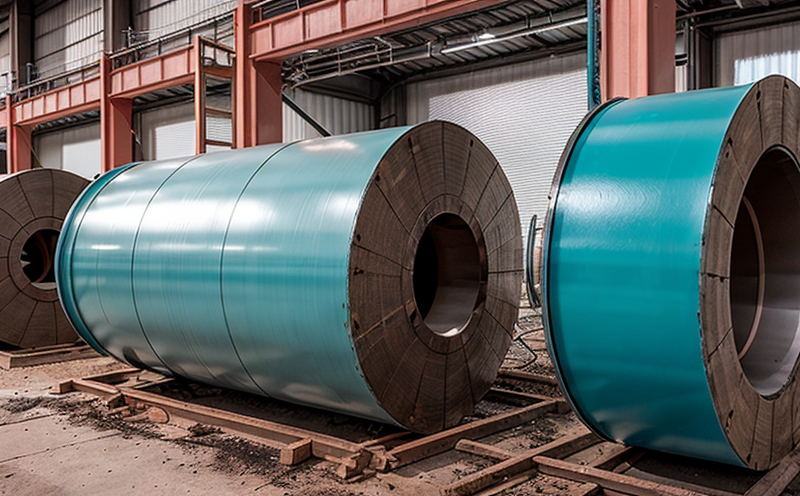ASTM G111 Corrosion Fatigue Testing of Metals
The ASTM G111 standard specifies a procedure to determine the resistance of metals and alloys to fatigue crack growth under cyclic loading in corrosive environments. This testing method is essential for ensuring that materials used in industrial manufacturing and processing are reliable, durable, and capable of withstanding prolonged exposure to corrosive conditions without failure.
Corrosion fatigue occurs when a material subjected to repeated stress cycles while exposed to a corrosive environment faces increased susceptibility to crack initiation and propagation. This phenomenon is particularly prevalent in industries like aerospace, automotive, petrochemicals, and marine engineering where components are often subjected to cyclic loading and harsh environmental conditions.
The ASTM G111 test involves subjecting specimens of the material under consideration to a series of stress cycles at a constant or varying load. Simultaneously, the specimen is exposed to an aggressive corrosive environment such as saltwater, sulfuric acid, or other relevant mediums. By monitoring the crack growth rate and fatigue life, this test provides critical insights into the material's resistance to corrosion fatigue.
The testing procedure requires precise control of environmental conditions, stress amplitude, frequency, and specimen geometry. Specimens are typically prepared by machining from wrought or cast alloys, ensuring uniformity for accurate results. The cyclic loading is applied using specialized equipment capable of generating controlled stress cycles under variable environments. Accurate monitoring of the crack growth rate is essential to ensure compliance with the ASTM G111 standard.
ASTM G111 testing is particularly valuable in industries where material integrity and durability are paramount. For instance, in aerospace engineering, ensuring that fasteners and structural components can withstand the cyclic loading during flight while exposed to atmospheric corrosion is critical for safety. Similarly, in marine applications, materials used in ship hulls or offshore structures need to resist saltwater corrosion under repeated stress conditions.
The test results provide essential data that helps material scientists and engineers select appropriate materials and design robust components. By understanding the fatigue crack growth behavior of metals under corrosive environments, manufacturers can optimize their product designs for improved longevity and reliability.
Industry Applications
| Industry | Potential Use Cases |
|---|---|
| Aerospace Engineering | Evaluating the durability of fasteners and structural components during cyclic loading in corrosive environments. |
| Automotive Manufacturing | Assessing the fatigue resistance of materials used in engine parts or exhaust systems exposed to corrosive conditions. |
| Petrochemical Industries | Determining the reliability of pipelines and storage tanks under cyclic loading with exposure to aggressive chemical environments. |
| Offshore Oil & Gas | Testing the integrity of offshore structures like risers and platforms in saltwater environments. |
| Marine Engineering | Evaluating materials used in ship hulls or marine equipment for resistance to saltwater corrosion under cyclic loading. |
Eurolab Advantages
At Eurolab, we leverage our advanced testing facilities and experienced technical staff to provide comprehensive ASTM G111 corrosion fatigue testing services. Our state-of-the-art laboratories are equipped with specialized equipment capable of simulating real-world environmental conditions accurately.
We offer a range of services tailored to meet the specific needs of our clients, including custom specimen preparation, detailed test setup, and precise monitoring of crack growth rates. Our team of experts ensures that all tests comply strictly with ASTM G111 standards.
Our commitment to quality is reflected in our ISO/IEC 17025 accreditation, which guarantees the reliability and accuracy of our results. By choosing Eurolab for your ASTM G111 testing needs, you can be confident that you are working with a reputable and trusted partner in the industry.
We also provide comprehensive reporting services, ensuring that all test data is presented clearly and concisely. This helps engineers and quality managers make informed decisions about material selection and design improvements.
Customer Impact and Satisfaction
- Enhanced product reliability through accurate fatigue crack growth rate analysis.
- Reduced risk of premature failure due to improved understanding of material behavior under corrosive conditions.
- Increased confidence in the durability of materials used in critical applications.
- Cost savings from reduced rework and replacement of failed components.
- Improved compliance with industry standards and regulations, ensuring long-term success.





